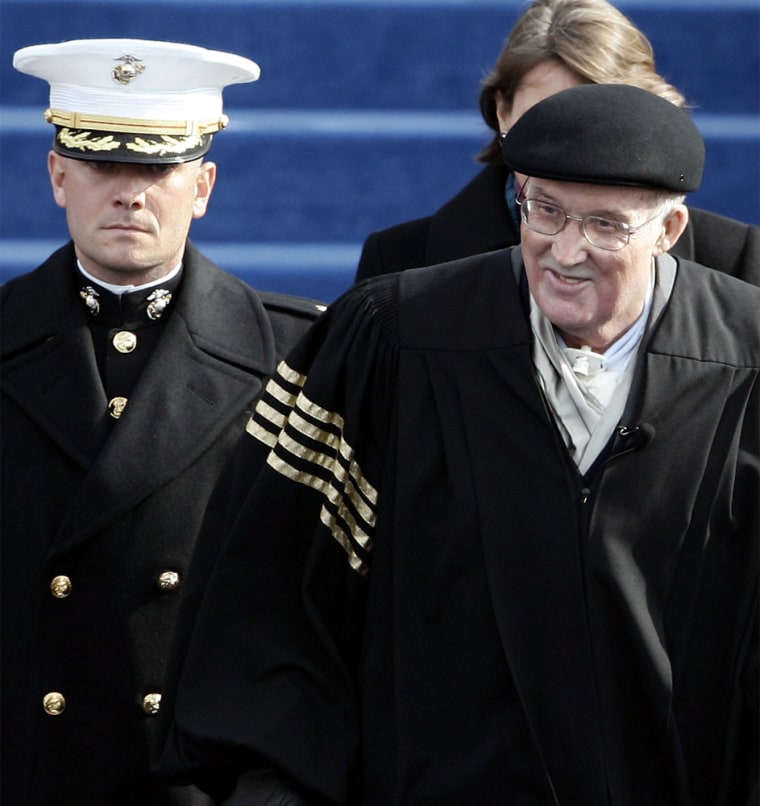Chief Justice William H. Rehnquist’s frailty at the inauguration is renewing speculation the Supreme Court soon will have its first vacancy in more than a decade.
How soon is anybody’s guess, though later rather than sooner may be better for President Bush, whose programs could stall in Congress once a fight over a high-court nomination begins.
Rehnquist, battling thyroid cancer, appeared fragile as he delivered the oath of office. It was his first public appearance since October, when he announced the diagnosis and went into seclusion.
A question being asked all over Washington on Friday was whether the appearance was the 80-year-old’s final public act before retiring, or a signal that he was well enough to remain on the court until the term ends in June.
“One scenario is he wanted to perform this duty without a lame-duck cloud hanging over his head. Now that he’s done it, he can announce that he’s retiring,” said Stephen Wermiel, an American University law professor.
Others were encouraged that Rehnquist walked with the assistance of only a cane and spoke clearly while swearing in Bush.
“Now the great, great likelihood is that he’ll remain chief justice through June,” said Supreme Court historian David Garrow of Emory University. “I think the alert level is down 90 percent.”
That could be a relief for the White House, just beginning a tough promotion in Congress of initiatives like revising Social Security to allow private investment accounts, simplifying the tax code and limiting medical malpractice and class-action jury awards.
A particularly contentious nominee would alienate Democrats and moderate Republicans whom Bush needs to get his plans passed.
A Rehnquist retirement would give the president a chance to elevate to chief justice one of the conservative court members he admires, Antonin Scalia or Clarence Thomas, and replace him with a new justice.
Or he could replace Rehnquist with someone who is not serving on the court. Among potential nominees are former deputy attorney general Larry Thompson and appeals court judges James Harvie Wilkinson III, John Roberts, Michael McConnell, Edith Jones, J. Michael Luttig and Samuel Alito Jr..
“The president has an ambitious agenda,” said Jay Sekulow, chief counsel of the conservative American Center for Law and Justice in Washington. “You put a judicial appointment in the middle of that mix, that becomes significant. ... I think it makes it more difficult (for Bush).”
Sekulow’s group has $2.5 million ready to spend defending Bush’s choice and is prepared for an announcement any time.
Liberal groups are ready as well. The People for the American Way has a war room with 50 work stations and plans to mobilize more than 1,000 groups against any Bush choice considered a threat to civil rights.
The last time the court went so long without turnover was in the 1800s, and People for the American Way President Ralph Neas said the confirmation will dominate Congress — and potentially upstage Bush’s other plans.
“I do think that would undermine all the other things he would like to do in terms of his second-term agenda,” Neas said.
Only speculation
So far, all anyone has is speculation — both about Rehnquist’s health and about prospects for a retirement.
Rehnquist celebrated his 33rd anniversary on the Supreme Court earlier this month and is the second-oldest chief justice ever.
The Republican revealed the cancer not long after the court started a nine-month term with major cases on the death penalty, Ten Commandments displays, medical marijuana, and government power to seize people’s homes.
Rehnquist has revealed only the barest of details about his illness, although outside medical experts said that, based on the treatment, he appears to have a kind of cancer that is usually fatal within months.
Rehnquist has been working mainly from home, and the court does not have a tremendously heavy workload. Justices begin a nearly monthlong break next week, and they have only about 30 more cases to hear.
